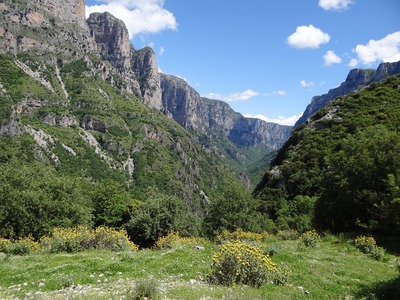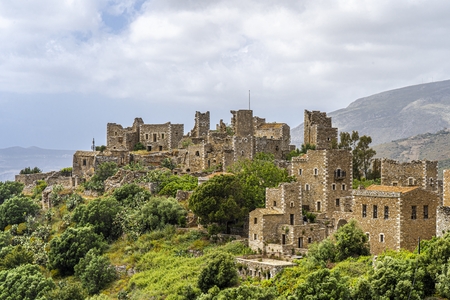When most travellers hear the name “Greece,” a predictable mosaic forms – Santorini’s whitewashed buildings, Athens’ Acropolis, and perhaps a taverna dinner under bougainvillea. But peel back the layers, and Greece tells a different story. One that breathes slowly in the shade of olive trees, drifts in fishing boats across forgotten islands, and simmers in the cracked silence of stone villages that never made the guidebooks. If you’re chasing something deeper than views, Greece might just become your quiet obsession.
Ikaria: Where Clocks Are Just Decoration
No neon signs. No jet skis. No pressure to be anywhere. Ikaria, a windswept island floating east of the Cyclades, seems allergic to the modern rhythm. Locals call it the “place where time forgot.” But maybe, it’s just the place that remembered how to live.
People here live long, very long. And it’s not because of yoga retreats or turmeric lattes. It’s because they nap when they’re tired, eat what they grow, and dance at festivals like time doesn’t exist. During the summer “panigiria” (all-night village feasts), strangers link arms and dance in wide, slow spirals to hypnotic violin music. There’s wine, there’s goat stew, and no one is checking their phone.
You won’t find luxury resorts, but you might find yourself swimming in a cove with only a wandering goat for company. And somehow, it’ll feel just right.
Mainland Mysteries: The Mountains of Epirus

If Greece has a wild heart, it beats in Epirus. This northwestern region, hugged by shadowy mountains and stitched with stone bridges, is practically unknown to outsiders. In the tiny village of Papingo, slate-roofed houses cling to the edge of the Vikos Gorge, one of the deepest canyons in the world.
The air smells like pine and wet rock. Time seems frozen here, like a half-finished sentence from centuries ago. Hiking trails here aren’t tourist-tamed, they’re old shepherd routes, worn in by generations. You might pass a mule, a crumbling monastery, or a waterfall crashing into icy turquoise pools. Every path feels like a secret.
In winter, the region is even quieter. The only sounds might be snow sliding off branches or the crunch of your boots. Epirus doesn’t entertain you, it dares you to listen.
Thessaloniki After Midnight: Greece’s Other City
Athens gets the spotlight. Thessaloniki plays bass in the background. This northern city is rougher around the edges, but richer in rhythm. By day, it’s a mosaic of Roman ruins, Ottoman domes, and smoky kafeneio corners where old men argue over politics in 5-hour chess matches. By night, it transforms.
Don’t look for clubs with velvet ropes, look for hidden basements with rebetiko bands. This is Greece’s blues: gritty, nostalgic, full of cigarette smoke and heartbreak. You might find yourself in a dim room where a bouzouki cries until 4 am, while locals sip tsipouro like it’s holy water.
Thessaloniki isn’t for show. It’s for staying up too late and remembering how to feel things.
The Island with No Cars: Hydra’s Quiet Roar
Only a short ferry from Athens, Hydra sounds like a tourist trap. But somehow, it dodges the cliché. There are no cars here. Just donkeys, cobbled lanes, and the sound of waves slapping the harbour.
But what sets Hydra apart isn’t silence, it’s subtle defiance. Artists, rebels, and writers have passed through here, and something of that energy lingers. Leonard Cohen once bought a house on the hill, wrote poetry, and fell in love here. You might do none of those things but you might stare at the sea and forget why you were ever rushing anywhere.
Hydra is a pause. A refusal to move faster just because the world demands it.
Where Time Unravels: The Abandoned Villages of the Peloponnese

Drive inland from Nafplio or Kalamata and you’ll find something strange: villages where doors swing in the wind, church bells gather dust, and fields grow wild around crumbling stone homes. These aren’t ruins for tourists, they’re the ghosts of real lives, abandoned as families moved to cities or abroad. In places like Vatheia or Old Kardamyli, history isn’t curated, it just remains.
And yet, there’s beauty in the decay. You can picnic under a fig tree growing through the roof of a 200-year-old house, or walk into a chapel and light a candle that no one will see.
Sometimes, the most honest stories are the ones no one is telling anymore.
More Than a Destination
Traveling in Greece doesn’t have to be an echo of other people’s trips. It can be something quieter, stranger, more personal. A taste of wild thyme picked from a hillside. A conversation with an old man who once operated a fishing boat, now just sits beside it. A piece of ancient pottery discovered, not behind glass, but in the soil beneath your feet.
In these small moments, Greece reveals itself, not as a museum but as a living, breathing place. One that asks only for your patience, your curiosity, and your willingness to get a little lost.
Maire Brown